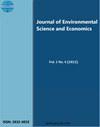A literature review on the effect of environmental orientation on firm performance, mediating factor of green supply chain management and electronic transaction levy
引用次数: 0
Abstract
The purpose of this literature review is to investigate the relationship between environmental orientation and Green Supply Chain Management, as well as their impact on company performance. It investigates the role of Green Supply Chain Management in mediating the link between environmental orientation and company performance. The review will begin with a thorough discussion of theoretical concepts of environmental orientation and Green Supply Chain Management. It will then investigate the relationship between environmental orientation and Green Supply Chain Management, as well as how it influences business performance. Heading on, it is more likely to investigate the impact of outside environmental focus on firm environmental selection, monitoring, and collaboration, followed by the impact of internal environmental orientation on these three components of Green Supply Chain Management. An investigation on the effect of environmental selection, monitoring, and collaboration on firms' sustainability performance will be reviewed. On the other hand, it will assess the mediating role of Green Supply Chain Management on the relationship between environmental orientation and firm performance. It will additionally look at the mediating role of environmental selection, monitoring, and collaboration on the relationship between external and internal environmental orientation and firm performance. The moderating effect of corporate environmental reactiveness on the link between environmental orientation and Green Supply Chain Management is an essential part of this paper, whereas, exploring the role of government regulation and consumer sensitivity in shaping the link between environmental orientation and Green Supply Chain Management will also be reviewed. It will then investigate the effect of Electronic Transaction Levy (E-Levy) on the impact of Green Supply Chain Management on firm performance. Studies have demonstrated that Green Environmental Orientation has a positive influence on Green Supply Chain Management procedures, which results in sustainable business performance环境导向对企业绩效的影响、绿色供应链管理的中介因素和电子交易税的文献综述
本文的目的是研究环境导向与绿色供应链管理之间的关系,以及它们对公司绩效的影响。研究了绿色供应链管理在环境导向与公司绩效之间的中介作用。本文将从全面讨论环境导向和绿色供应链管理的理论概念开始。然后,它将调查环境取向和绿色供应链管理之间的关系,以及它如何影响业务绩效。接下来,它更有可能研究外部环境关注对企业环境选择、监测和合作的影响,其次是内部环境取向对绿色供应链管理这三个组成部分的影响。本文将对环境选择、监测和合作对企业可持续发展绩效的影响进行调查。另一方面,评估绿色供应链管理在环境导向与企业绩效关系中的中介作用。它还将研究环境选择、监测和协作对外部和内部环境取向与企业绩效之间关系的中介作用。企业环境反应对环境取向与绿色供应链管理之间联系的调节作用是本文的重要组成部分,而政府监管和消费者敏感性在形成环境取向与绿色供应链管理之间联系中的作用也将被回顾。然后,研究电子交易税(E-Levy)对绿色供应链管理对企业绩效的影响。研究表明,绿色环境取向对绿色供应链管理程序有积极的影响,从而导致可持续的经营绩效
本文章由计算机程序翻译,如有差异,请以英文原文为准。
求助全文
约1分钟内获得全文
求助全文
来源期刊

Journal of Environmental Science and Economics
Environmental Economics-
自引率
0.00%
发文量
0
期刊介绍:
Journal of environmental science and economics (JESCAE), ISSN: 2832-6032 is an open access peer-reviewed journal that considers articles and reviews articles on all aspects of environmental economics.
Aim and Scope
Journal of Environmental Science and Economics is an international scholarly refereed research journal that aims to promote the theory and practice of environmental economics, Sustainability research, technological innovation, and economics. A broad outline of the journal''s scope includes; peer-reviewed original research articles, case, and technical reports, reviews and analyses papers, short communications and notes to the editor, in interdisciplinary information on the practice and status of research in environmental science, sustainability, technological innovations, and economics.
The main aspects of research areas include, but are not limited to; Environmental pollution control and abatement technology, Sustainable and economic Development, sustainable consumption and Sustainability, Environmental and sustainability assessment, transport and fate of pollutants in the environment, concentrations and dispersion of wastes in air, water, and non-point sources pollution, atmospheric pollutants and trace gases, environmental impact assessment, industrial ecology, ecological and human risk assessment; improved energy management and auditing efficiency and environmental standards and criteria.
 求助内容:
求助内容: 应助结果提醒方式:
应助结果提醒方式:


